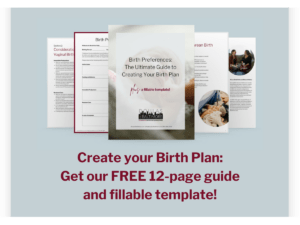We’ll start with the unfortunate truth: the US does not guarantee paid parental leave on a national level, and not all workers qualify for the six weeks of unpaid leave federal law mandates. According to the Washington Post, “Most Americans do not have access to paid family leave through their employer.”
All of this means that there is no standard for when you return to work after parental leave: it could be six weeks or six months. But regardless, returning to work–for either the birthing person or partner, can be a significant transition. You may be thinking about everything from your energy levels, your schedule, pumping and/or feeding, your partner’s schedule, and how your baby will do without you. Here are 4 things to consider and plan for before you return to work.
Know what your leave looks like and be open with your employer.
Long before delivery you may be thinking about your parental leave options–both what your employer offers and what your ideal scenario might be. Be open with your employer and consider asking for something that might make the transition back to work easier. That might include returning part-time at first or working from home. Your employer might also be willing to be flexible in ways that they haven’t shared with you. Ask other employees or your employer directly about how others have returned to work after leave.
Think about childcare after parental leave, and then come up with a back-up plan.
You may have come up with the perfect childcare solution: you are returning part-time to work and a friend or family member is baby-sitting on the other days. In 2022, that might be problematic because of changes in school openings due to COVID. Or, the caregiver might have to quarantine after a COVID exposure. Problems could arise simply because they are not as reliable as you would like them to be. Whatever your childcare plan involves after you return to work, come up with a backup plan. If you have a family member caring for baby, what happens if they are sick?
If you are working from home, remember that you are still working and taking care of baby is also full-time work. Although working from home can make it easier to care of baby, you should still try to have a secondary caregiver available. Some of our clients have utilized our postpartum doulas while working from home to ease that transition.
Figure out priorities and roles for when return to work after parental leave.
You partner may have taken little or no time off after baby arrived. But, your transition back to work is still a transition for them as well. Take time to figure out each of your priorities and roles. If you are not a morning person, consider having your partner take care of baby’s or the family’s morning routine. This way, you can get ready for work in the way that you need to. Discuss who will pickup baby or kids from caregivers, daycare, or school. You may have figured out a postpartum plan of who was cooking and cleaning, but you may need to revisit those plans if both partners are back at work.
Don’t be afraid to acknowledge your emotions and ask for help.
The postpartum period can be difficult: you are adapting to a new family member. If you gave birth, you may be experiencing physical changes in your body as well (link to blog). You are going to have a lot of emotions–from being excited about being back at work to sad that your baby is someone else’s care. Don’t be afraid to acknowledge that whole range of emotions and understand that they are all OK. If you being feeling overwhelmed when you return to work after parental leave, ask for help, whether from your partner, family, friends, or other loved ones.


